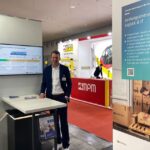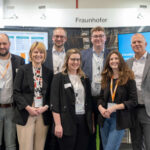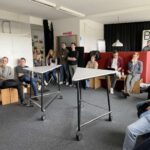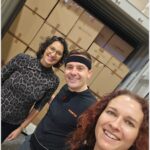The research infrastructure, the workshops and the researcher meetings at the barbecues: it is thanks to these community formats at the Center of Excellence Logistics and IT, that the developers of the intelligent small load carrier “Emili” can push their project forward even more intensively.
What is the “Emili” project all about?
Thomas Kirks: “Emili” is the abbreviation for “ergonomic, mobile, interactive load carrier for intralogistics”, developed at the Fraunhofer Institute for Material Flow and Logistics (IML). It is the first autonomous driverless transport vehicle that enables intuitive communication with people. “Emili” can be controlled, beckoned and waved away by using gestures – which means it interacts directly with the people in its environment.
Jana Jost:Since the first presentation of “Emili” in 2017, we have been continuously developing the system further. We not only address technological issues, but also topics such as user-friendliness, i.e: How can we optimize the system with people in mind?
What added value did the Center of Excellence Logistics and IT provide for this work?
Thomas Kirks: The Center of Excellence Logistics and IT bundles the research expertise of various institutions at the science location of Dortmund. Among them is the Leibniz Research Centre for Working Environment and Human Factors at the TU Dortmund (IfADo). The staff there focus on investigations into the performance and resilience of human information processing processes. This is exactly the know-how we need for our project – to optimize “Emili’s” interaction with humans.
Jana Jost: In designing questionnaires for laboratory tests, we were able to draw on existing knowledge and ultimately share the evaluation with IfADo. This procedure saves resources and increases the quality not only of our research work, but of research in general.
Which formats of the Center of Excellence were of particular benefit for “Emili’s” further development?
Jana Jost: The regular discussions between the research clans mean that new research potential can always be leveraged and specific innovations can be generated. The “Researchers’ BBQs” also make an important contribution to helping us drive our projects forward more quickly. At one of the recent events, representatives of the research clans presented their infrastructures and core expertise in more detail. Subsequently, new partners were found via speed dating. Together with the research clan for “Digital Business Engineering” we will now work intensively on business models which will use “Emili” in various fields of application.
Thomas Kirks: The uncomplicated use of the research infrastructure across all the participating institutions in Dortmund is also a decisive factor for success. For a further study on “Emili”, for example, we can use the research centre at the Chair of Materials Handling and Warehousing at the TU Dortmund and, together with staff from the Chair and the IfADo, we will implement a test set-up in virtual reality there. We are investigating the question of how close people and technology can or must get in order to work together efficiently and in a spirit of trust. We will then continue the experiment in the Research Hall for Cellular Conveying Technology at the Fraunhofer IML.



